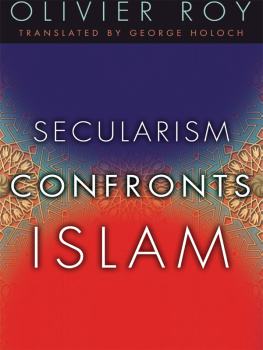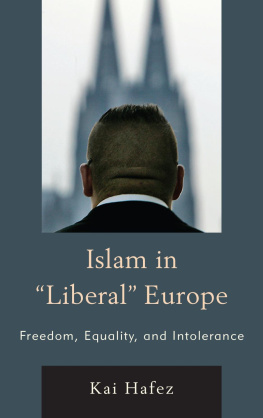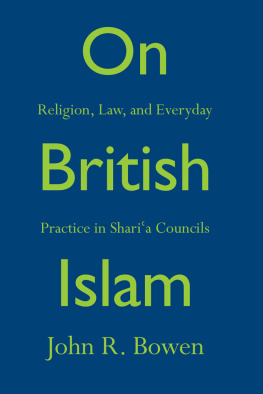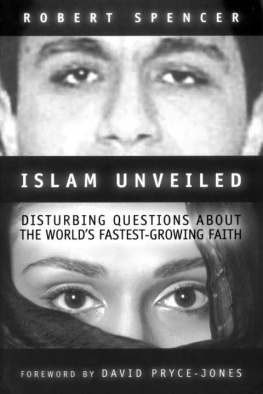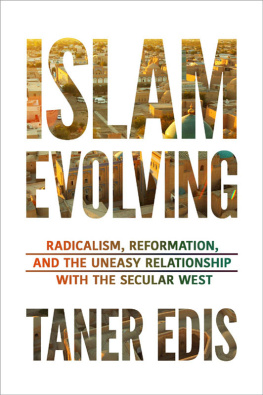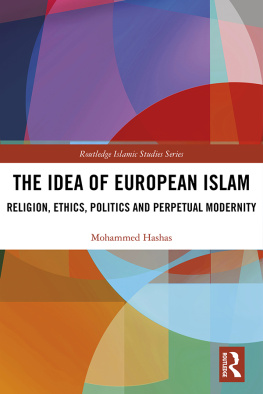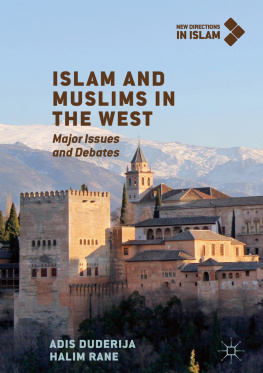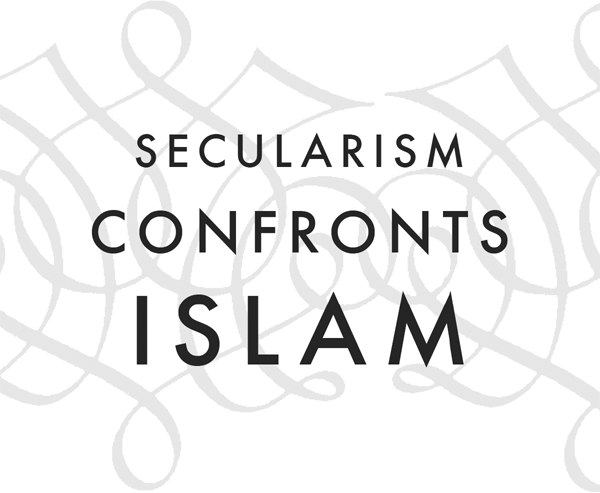SECULARISM CONFRONTS ISLAM
Columbia University Press
Publishers Since 1893
New York Chichester, West Sussex
cup.columbia.edu
Original French edition copyright Editions Stock, 2005
Translation copyright 2007 Columbia University Press
All rights reserved
E-ISBN 978-0-231-51179-7
Library of Congress Cataloging-in-Publication Data
Roy, Olivier, 1949
[Lacit face lislam. English]
Secularism confronts Islam / Olivier Roy ; translated by George Holoch.
p. cm.
Includes bibliographical references and index.
ISBN 978-0-231-14102-4 (cloth : alk. paper) ISBN 978-0-231-14103-1 (pbk. : alk. paper) ISBN 978-0-231-51179-7 (electronic)
1. IslamFrance. 2. Islam and secularismFrance. 3. Islam and stateFrance. 4. LaicismFrance. 5. FundamentalismFrance. I. Title.
BP65.F8R6913 2007
322'.10944dc22 2007001748
A Columbia University Press E-book.
CUP would be pleased to hear about your reading experience with this e-book at .
CONTENTS
Introduction:
Lacit and the Identity of France
1 French Lacit and Islam:
Which Is the Exception?
3 The Crisis of the Secular State
and the New Forms of Religiosity
Islams encounter with the West is as old as Islam itself. The first Muslim minorities living under Western Christian domination date back to the eleventh century (in Sicily). Yet the second half of the twentieth century witnessed a distinctively new phenomenon: the massive, voluntary settlement in Western societies of millions of Muslims coming from Muslim societies across the Middle East, the Indian subcontinent, Turkey, Africa, and Southeast Asia. The West has also witnessed the development of an indigenous trend of religious conversion (as in the case of the Nation of Islam). And yet, while a Muslim population has definitively taken root in the West, the question of its integration remains open, especially in western Europe, where there is an overlap between Islam and work-driven immigrationan overlap that is not to be found in the United States. Socioeconomic problems, cultural issues, and political tensions related to terrorism or the conflicts in the Middle East converge around the question: Is Islam compatible with the West? Of course, this question rests on an essentialist worldview, according to which there is one Islam, on the one hand, and one Western world, on the other hand. From that perspective, the West is allegedly defined by a set of values (freedom of expression, democracy, separation of church and state, human rights, and, especially, womens rights). But a problem immediately arises: Are these Christian values? Is the opposition between Islam and the West derived from the fact that the West is Christian? Or is it rather because the West is secularized and no longer locates religion at the heart of its self-definition? Is it Christianity or secularism that makes the West so distinct?
The relation between secularism and Christianity is complex. Either one defines the West in Christian terms, or one defines it in reference to the philosophy of the Enlightenment, human rights, and democracy that developed against the Catholic Church, through first the Protestant Reformation, then the Enlightenment, and finally a secular and democratic ideal. If the Catholic Church has always fought secularism and the separation of church and state (at least until the beginning of the twentieth century), Protestantism has played a more complex role by defending a sort of religious civil society in which the separation of church and state is seen as a necessary condition for a genuine religious revival. Secularization therefore proceeds differently in Catholic and Protestant societiesagainst faith in the former, along with faith in the latterto such an extent that it is difficult to talk about the West.
Contemporary Western societies, however, are, in fact, secularized, either because the separation of church and state is a constitutional principle (the United States), because civil society no longer defines itself through faith and religious practice (the United Kingdom, Germany, the Scandinavian countries), or because these two forms of secularism converge and reinforce each other, thus giving birth to what the French call lacit. And yet when one opposes the West and Islam, it is by putting forward the Christian origins of Western culture or, on the contrary, by emphasizing its secularism. In other words, when we question Islams capacity to become Westernized, we are referring to two different forms of Western-ization: Christianization and secularization. Of course, things are more complex, and it would be easy to show that Western secularism actually has a Christian originas I do in this book. But it is interesting to see that the critique of Islam is today a rallying point for two intellectual families that have been opposed to each other so far: those who think that the West is first and foremost Christian (and who, not that long ago, considered that the Jews could hardly be assimilated) and those who think that the West is primarily secular and democratic. In other words, the Christian Right and the secular Left are today united in their criticism of Islam.
But if Christianity has been able to recast itself as one religion among others in a secular space, why would this be impossible for Islam? Two arguments are usually summoned to make this case: the first is theological and says that the separation between religion and politics is foreign to Islam; the second is cultural and posits that Islam is more than a religion: it is a culture. Both arguments will be addressed in this book. But this theoretical debate, which thrives on op-ed pieces and talk shows, is increasingly solved in the practice of Muslims themselves. The experience of everyday life as a minority brings Muslims to develop practices, compromises, and considerations meant to cope with a secularism that imposes itself on them. This does not mean that Islam has never experienced secularism but only that, with the exception of a few isolated thinkers, it never felt the need to think about it. Today, both life conditions in the West and the domination of the Western model through the process of globalization compel many Muslims to relate explicitly to this form of secularism, somewhat urgently and under the pressure of political events. This reflection spans a very wide intellectual spectrum that goes from what I call neofundamentalism to liberal positions, proceeding through all kinds of more or less enlightened conservatism.
Unfortunately, the paradigms and models mobilized in the Western debate over Islam hardly reflect the real practices of Muslims. While the political debate over the potential danger allegedly rep-resented by Muslims is more or less inspired by the intellectual debate about the clash of civilizations, the help of sociology (that is, the concrete analysis of Muslim practices) is hardly sought even though sociology is at pains to grasp the concrete forms of religiosity that characterize the practice of Islam within immigrant communities. One must therefore abandon the current models in order to understand how it is possible to practice ones faith as a Muslim in a secularized Western context. And one quickly realizes then that Muslims tend to find themselves in a position that is closer to that of the born-again Christians or the Haredi Jews than to the position of a stranger.

